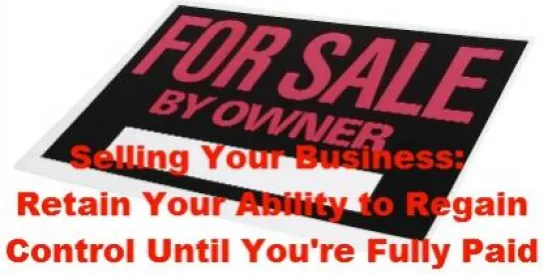Many business owners are so anxious to retire or move on they take risks in the sale of their biggest asset that are greater than they ever would have taken in their business. This anxiety may lead some sellers to agree to finance part of their sales price–they become lenders in order to be sellers. Then, they don’t act like smart lenders.
-
If you’re going to be a lender, think like one:
- Know the source of the buyer’s down payment. If it’s borrowed, the buyer will have less incentive to make the business work;
- If part of the down payment is borrowed and secured by the assets of the business, be sure you know the terms of the loan–you may have to pay it to protect your investment.
- Negotiate the ability to learn of problems early and to regain control of the business. This protects its ability to generate the income to pay you and keep its valuable employees.
- Be willing to manage the hand-off of your goodwill. Your customers could be part of your early warning system to discover problems while they’re manageable.
- Build a financial incentive for your buyer to pay you early. Discounts for early payment and scheduled increases in interest rate are common methods.
- Satisfy yourself that the buyer is capable of running a successful business.
- Beware the broker or closing agent that tells you an attorney isn’t needed. Every deal is different. While the industry has forms to help streamline negotiations, they are not written to replace lawyers and the advice only they can give. Every seller and buyer of a business should have a lawyer.
- The closing agent, even when a law firm, is not a substitute for your own lawyer. Closing agents are neutral third parties – they can’t advise one of their clients over their other client. Closing attorneys often use paralegals – so the firm’s attorneys have limited contact with a file. For a neutral third party, that’s fine. It’s your attorney that should be finding the red flags.
An all too common scenario: seller accepts an offer with a top price and a hefty down payment. The balance of the price will be financed by the seller and secured by the assets of the business. That loan will be in second lien position on the assets behind a loan the buyer gets for the down payment and other expenses.
The seller is attracted by the high price and down payment. The seller is confident the business will succeed and the buyer will be able to pay the remainder of the purchase price.
No one’s there to say “snap out of it!” At closing, the buyer will owe more than the purchase price but will have invested none of their own money. If things go badly, the bank will get paid first from the sale of the assets. The seller may not have the money to pay off the lender to protect the business. Thanks to the buyer’s poor management the business may have lost its value or its ability to succeed. The seller might sue the buyer on the promissory note, but could face expensive litigation costs and, as often happens, counter claims from the buyer related to alleged oral promises from the seller. Even if the seller prevails the buyer has never had to show that he was good for the money.


 />i
/>i
